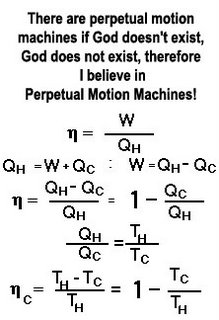 The recent “Brouhaha” has caused me to add my two-cents, perhaps unwisely. A more general look related but not on this topic can be found on JollyBlogger discussing Frame’s paper, Machen’s Warrior Children
The recent “Brouhaha” has caused me to add my two-cents, perhaps unwisely. A more general look related but not on this topic can be found on JollyBlogger discussing Frame’s paper, Machen’s Warrior ChildrenI first come to “know” Phil many years ago. (although he doesn’t know me from spit) I spent quite a few hours lurking on IRC (circa 1993 and later) watching him and David Ponter logically disassemble challengers’ arguments. At that time, although I had regularly attended a typical Southern Baptist church all of my life, I had never, and I mean NEVER, considered that Christianity may be intellectually stimulating. I was quite new to the whole idea of the Doctrines of Grace and in no small measure ignorant of any kind of systematic theology. Inevitably this led me to repeatedly and unwisely break from the lurking, pop my head up to disagree; only to have it unceremoniously handed back to me on a platter. Were they gentle? No! Were polite? No! Was I as mad as a hornet? Yup! Were they correct? Well…let me put it this way… in my quest to learn enough to prove them wrong (a quest consuming years), I was usually persuaded to most of their views in my searching of the Scriptures.
What have I learned from this? How should we contend for those things that we believe? How do we properly respond to correction from other Christians?
- First and foremost, submit to the testimony of the Holy Spirit. Do not persist in defending you position for pride’s sake when you know you are wrong.
- If you are clearly academically outclassed, you would be best served to spend some time studying the scriptures. It is pointless to debate from a position of ignorance unless it is an exercise for learning with an elder or a mentor who you are being discipled by.
- Don’t be a candy-britches that can’t cope with a little contention. Our culture has so feminized itself that a good wrestling match among brothers is viewed as “violence” rather than iron sharpening iron. Skip the pop-psychology teachings of conflict avoidance/resolution and concentrate on the Biblical concept of constructive controlled expression, while avoiding unbridled passion. See my post on Christian Anger
- Over the years you will find, in your searching of the scriptures, that certain individuals, authors, and teachers will demonstrate themselves to be exceptionally trustworthy in understanding Scripture; deviate from their path with extreme caution, especially if you have not mastered the subject at least as well as they have.
- If you are forced because of time or inability to rely upon another’s scholarship that you have found trustworthy, do not do your cause a disservice by engaging opponents that you are clearly not equipped to debate.
- Our pride and our actions are not worthy of contentious defense. Scriptural truths are. If you find yourself defending yourself rather than Scriptural truths, humility is probably the best course of action. Often conceding offense and making an apology for ones actions is preferred, even if you had not acted inappropriately.
- If a brother’s behavior or actions are unjustly maligned, be quick to defend him so that he does not have to. If he is being justly accused, your silence will speak volumes. If the brother is particularly close, work for his restoration.
- Naturally, we have an affinity for and seek to defend those who have mentored or discipled us in a powerful way. What we all too often forget is that “the master” can take care of himself, and we end up doing more harm than good.
- When we find ourselves in a debate with someone who has mentored or discipled large numbers of people over and extended period of years (i.e. James White), they will necessarily have less spiritually mature disciples who will seek to defend them. Remember, they are not your target or concern. Convince “the master” and his disciples will follow. You are unlikely to “convert” them by direct confrontation and it takes your emphasis away from the task at hand. Rest assured that they are closely following the debate between you and their mentor.
- And finally, correct those you mentor if they become too rancorous.
I realize that Phil Johnson is only at the periphery of this “Brouhaha” and this post is not intended as a commentary on his actions or anyone’s in particular. I am using this post to demonstrate that through contentious debate, in spite of the immediate tension, that fruit of the spirit is produced. I am using my experience with Phil as an example of how, even though I was as mad as the bloody blue blazes at him, Christian contention is a refiner’s fire. It may make us uncomfortable and temporarily separate us, but over the long run God is using it to grow the church, of this we can be sure.
 I am sure that Phil has no idea of the lives he has touched. He probably doesn’t get to hear very often that the Lord extends the work He does through him beyond his wildest imagination. Even though I am sure that Phil would/will unceremoniously hand me my head on a platter in the future, I feel greatly indebted to him for all that he has unknowingly taught me. For better or worse, I guess you could call me one of Pyromaniac’s Warrior Children…
I am sure that Phil has no idea of the lives he has touched. He probably doesn’t get to hear very often that the Lord extends the work He does through him beyond his wildest imagination. Even though I am sure that Phil would/will unceremoniously hand me my head on a platter in the future, I feel greatly indebted to him for all that he has unknowingly taught me. For better or worse, I guess you could call me one of Pyromaniac’s Warrior Children…


 There are two incorrect ways to look at Christian doctrine. One is to take an anti-intellectual approach; the other is to take an overly rigid rational approach
There are two incorrect ways to look at Christian doctrine. One is to take an anti-intellectual approach; the other is to take an overly rigid rational approach In the epistemological discussion posted yesterday, there are some truths that arise that I wanted to post today as a side note:
In the epistemological discussion posted yesterday, there are some truths that arise that I wanted to post today as a side note: